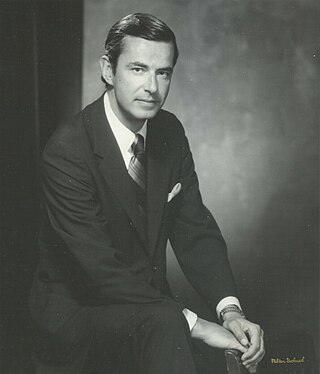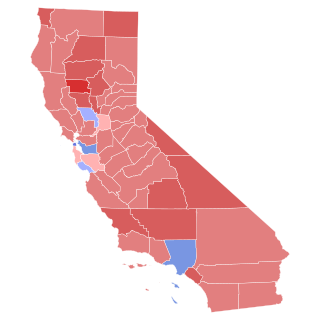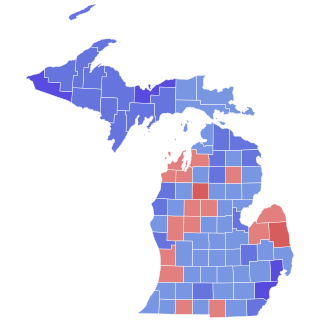
Sander Martin Levin is an American politician who served in the United States House of Representatives from 1983 to 2019, representing Michigan's 9th congressional district. Levin, a member of the Democratic Party from Michigan, is a former ranking member on the House Ways and Means Committee; he was Chairman of the Ways and Means Committee from 2010 to 2011. He is the older brother of former U.S. Senator Carl Levin, and the father of former Congressman Andy Levin, his successor.

The 1988 United States Senate elections were elections for the United States Senate. Held on November 8, the 33 seats of Class 1 were contested in regular elections. In spite of the Republican victory by George H. W. Bush in the presidential election, the Democrats gained a net of one seat in the Senate. Seven seats changed parties, with four incumbents being defeated. The Democratic majority in the Senate increased by one to 55–to–45.

The 1982 United States Senate elections were held on November 2, 1982. They were elections for the United States Senate following Republican gains in 1980. The 33 Senate seats of Class 1 were up for election in 1982. A total of four seats changed hands between parties, with Democrats winning seats in New Jersey and New Mexico, and Republicans taking seats in Nevada and the seat of the lone independent, Senator Harry Byrd Jr., in Virginia. Democrats made a net gain of one seat bringing them to 46 seats, while Republicans stayed at 54 seats for a majority. However, the Democratic gain in New Jersey replaced a Republican that had been appointed earlier in the year.

The 1978 United States Senate elections were held on November 7, in the middle of Democratic President Jimmy Carter's term. The 33 seats of Class 2 were contested in regular elections. Special elections were also held to fill vacancies.

The 1976 United States Senate elections was an election for the United States Senate. Held on November 2, the 33 seats of Class 1 were contested in regular elections. They coincided with Democrat Jimmy Carter's presidential election and the United States Bicentennial celebration. Although almost half of the seats decided in this election changed parties, Carter's narrow victory did not provide coattails for the Democratic Party. Each party flipped seven Senate seats, although, one of the seats flipped by Democrats was previously held by a Conservative.

The 1930 United States Senate elections occurred in the middle of Republican President Herbert Hoover's term. The 32 seats of Class 2 were contested in regular elections, and special elections were held to fill vacancies. With the Great Depression beginning to take hold, Republican incumbents became unpopular, and Democrats picked up a net of eight seats, erasing the Republican gains from the previous election cycle. Republicans retained control of the U.S. Senate since Vice President Charles Curtis cast the tie-breaking vote. This was the first of four consecutive Senate elections during the Depression in which Democrats made enormous gains, achieving a cumulative pick-up of 34 seats.

Philip Edward Ruppe is an American former politician from the U.S. state of Michigan and a member of the Republican Party. He served in the U.S. House of Representatives from 1967 to 1979 before running, unsuccessfully for the United States Senate in 1982. He is a Korean War veteran, having served as a lieutenant in the U.S. Navy. After leaving the U.S. House, Ruppe became active in business before running for election, without success, to the 103rd Congress.

The 2000 United States Senate election in Connecticut took place on November 7, 2000 in conjunction with the 2000 U.S. presidential election, other elections to the United States Senate in other states, as well as elections to the United States House of Representatives and various state and local elections. Incumbent Democratic U.S. Senator Joe Lieberman won re-election to a third six-year term.

The 1974 United States Senate election in Ohio took place on November 3, 1974. It was concurrent with elections to the United States House of Representatives. Incumbent Democratic U.S Senator Howard Metzenbaum was running for election his first full term after he was appointed in 1974 by Ohio governor John J. Gilligan to fill out the Senate term of William B. Saxbe, who had resigned to become United States Attorney General. Metzenbaum lost the primary election to John Glenn, who went on to win the general election and win every county in the state. Metzenbaum would later be elected in the other U.S. Senate seat in 1976 and worked with Glenn until he retired from the post in 1994.

The 1986 United States Senate election in California took place on November 4, 1986. Incumbent Democratic U.S. Senator Alan Cranston narrowly won re-election to a fourth and final term over Republican U.S. Congressman Ed Zschau. This was the last time where both major party nominees for the Class 3 Senate seat in California were men until 2022.

The 1994 United States Senate election in Michigan was held November 8, 1994. Incumbent Democratic U.S. Senator Don Riegle decided to retire and not run for re-election. Republican Spencer Abraham won the open seat, becoming the first Republican to win a U.S. Senate race in Michigan since Robert P. Griffin in 1972 and the first to win the state's Class I seat since Charles E. Potter in 1952. As of 2024, this was the only time since 1972 that Republicans won a U.S. Senate election in Michigan.

The 1978 United States Senate election in Michigan was held on November 7, 1978. Incumbent Republican U.S. Senator Robert P. Griffin ran for re-election to a third term, but was defeated by the Democratic candidate, Detroit City Council President Carl Levin.

The 1982 United States Senate election in California took place on November 2, 1982. Incumbent Republican U.S. Senator S. I. Hayakawa decided to retire after one term. Republican Pete Wilson, the Mayor of San Diego, won Hayakawa's open seat over Democratic Governor Jerry Brown and several minor candidates.

The 1976 United States Senate election in California took place on November 2, 1976. Incumbent Democratic U.S. Senator John V. Tunney ran for re-election to a second term, but was defeated by Republican S. I. Hayakawa. As of 2023, this is the last time an incumbent Democratic Senator from California lost re-election.

The 1976 United States Senate election in Indiana took place on November 2, 1976. Incumbent Democratic U.S. Senator Vance Hartke ran for re-election to a fourth term, but was defeated by Republican challenger Richard Lugar.

The 1976 United States Senate election in Michigan took place on November 2, 1976. Incumbent Democratic U.S. Senator Philip Hart decided to retire instead of seeking a fourth term because he had terminal cancer. Republican turned Democrat Representative Donald Riegle won the open seat, keeping it in Democrats' hands.

The 1934 United States Senate election in Maryland was held on November 5, 1934.

The 1944 United States Senate election in California was held on November 7, 1944.

The 1964 United States Senate election in Michigan took place on November 3, 1964. Incumbent Democratic U.S. Senator Philip Hart was re-elected to a second term in office over Republican Elly Peterson.

The 1980 United States Senate election in Kansas took place on November 4, 1980. Incumbent Republican U.S. Senator Bob Dole was re-elected to his third term in office, after briefly campaigning for President earlier that year. He defeated Democrat John Simpson, who had previously served in the Kansas State Senate as a Republican.























